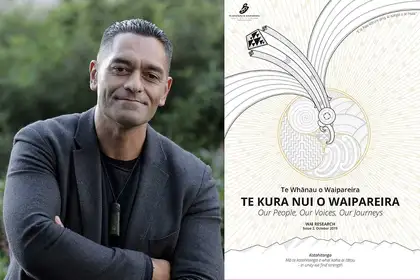
Professor Meihana Durie and the latest issue of Te Kura Nui o Waipareira.
A unique academic journal is being hailed as a forward thinking collaboration between Māori researchers and the community.
Te Kura Nui o Waipareira is a peer-reviewed online resource brought to life through a collaboration between Te Whānau o Waipareira in West Auckland and Te Pūtahi-a-Toi, Massey University. It brings together frontline Whānau Ora workers, health practitioners and researchers from New Zealand and around the world.
Launching its third issue, co-editor Professor Meihana Durie, head of Massey’s Te Pūtahi-a-Toi, School of Māori Knowledge, says Te Kura Nui o Waipareira Journal is unique.
“This publication was established to elevate and amplify the voices of those who are engaging every day with whānau. Their observations and experiences are critical, particularly in light of transferring knowledge that will ultimately help enable our whānau to flourish and those who work alongside whānau to be better informed.”
The journal highlights initiatives that are whānau-centred and includes insights from indigenous practitioners. The articles provide evidence from practitioners delivering new and innovative programmes, as well as participating families, and facilitates discussion from those who are the driving force behind the inception of holistic and whānau-centred strategies.
The challenges of learning te reo Māori
The journal includes articles by two Te Pūtahi-a-Toi staff members. Stacey Morrison’s article, ‘Kotahitanga in te reo Māori revitalisation’ highlights some of the anguish that whānau can experience in attempting to learn te reo Māori and identifies a number of critical success factors that empower whānau to overcome the barriers to acquiring te reo Māori.
The article gives particular emphasis to the new te reo Māori initiative Te Reo Matahīapo, a Te Mātāwai-funded programme that aims to restore te reo Māori as a first language across communities of whānau in South and West Auckland. Ms Morrison believes the insights provided will help advance other similar initiatives.
“Engaging with learning te reo Māori is not simply an intellectual undertaking for our people, it is both demanding and rewarding emotionally, and spiritually,” she says. “The more we share our stories, the less alone we will feel as we journey to reclaim our ancestral language.”
Whanaungatanga and wellbeing
Angelique Reweti explored the concept of whanaungatanga. Her article, ‘Tū kahikatea, whanaungatanga as a catalyst for wellbeing’, highlights the personal insights and experiences of a range of whānau members who participated in a local whānau-based triathlon. Emerging from this and other similar whānau-centred initiatives she explored, is a new framework, E Tū Kahikatea, that draws its inspiration from the way in which whānau growth occurs when the kaupapa and empowerment is strong.
Ms Reweti says the framework will provide a reference point for further analysis of whānau-centered journeys that navigate all dimensions of hauora (vitality). “The Tū Kahikatea framework shows the effectiveness of whānau inspired programmes that are based on Māori cultural principles and highlights the positive intergenerational health outcomes that can be driven and sustained by whānau,” she says.
Professor Durie says the journal offers valuable insights and knowledge not only for those who work directly with whānau across a broad and diverse range of settings, but also for health and social service providers, policy analysts, government agencies, whānau practitioners and academics.
Download the latest issue of Te Kura Nui o Waipareira.